How to learn French vocabulary fast - 7 actionable tips
Do you wish you could learn French vocabulary faster?
Or maybe learning new words isn’t so much a problem for you but you wish you’d be able to find the right word at the right time when you speak, without making ten mistakes in a sentence or having to think between each word.
If so, you’re in the right place. In this article I’ll share 7 easy & actionable tips that will make it so much easier for you to improve your French vocabulary.
If you like this video, click here to subscribe to my YouTube channel. I made many videos about French learning strategy & mindset; the two things that are sorely missing from most French learning books & classes.
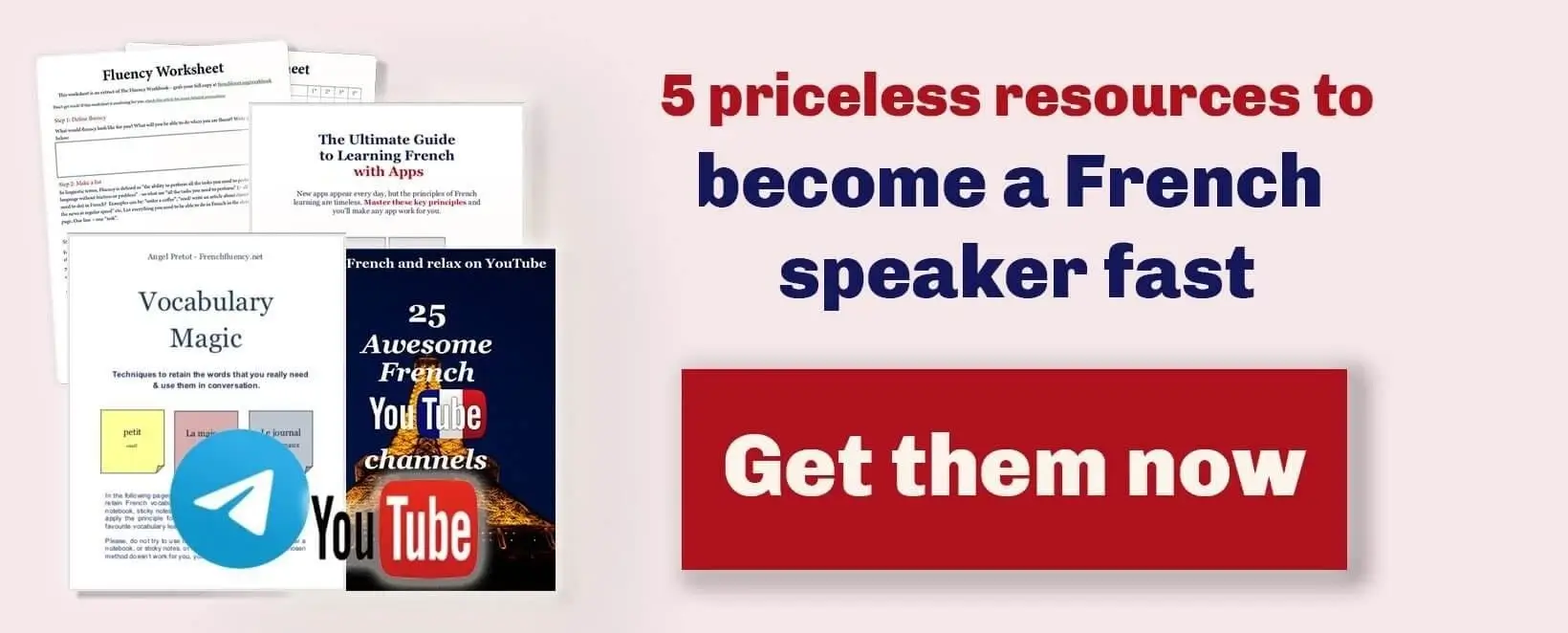
Most of these tips are counterintuitive and I keep seeing learners doing the opposite and running into problems because of it.
In fact, I’ve made these mistakes in my own language learning journey over and over until I learned better. So I’m certainly not pointing fingers. It’s hard to know what pitfalls to avoid.
Some of these pitfalls are very sneaky because they won’t slow you down immediately but they’ll create huge issues down the line, when you reach intermediate level. My last tip on this list will help you avoid these issues and save months of frustration. If you’re an intermediate student and you are already experiencing this frustration, you will understand why and know how to correct them. So make sure you read until the end.
Learn fewer words
You might have heard that your brain has unlimited capacity to learn. In fact, the more you learn, the more you can learn. This is true. The total capacity of your brain is unlimited - but the bandwidth is not.
You know this, if you have a job that’s demanding intellectually, or if you have studied a lot: there’s only so much you can learn at a time until your brain blatantly refuses to take anymore before it has digested the previous intake.
Of course, if you’re stacking French learning on top of a demanding career, it’s even worse.
So I recommend not trying to learn more than 10 new words a day, and if you’re exhausted, busy or sleep-deprived, limit yourself to 5 words a day.
It’s more than you need, especially if you apply the other tips on this list. It’s better to learn 5 words that are super useful and know them well, than try to learn 50 words that could come in handy someday and fail to remember them because your brain just can’t learn so much at a time.
2) Select your vocabulary
Not all words are equal. There are around 100 000 words in the French language, but some natives only ever use 500 of them and they can live a normal life in France.
Quick calculation: If you learn 5 words a day, for 100 days, after three months you can already have all the minimal amount of vocabulary that the least skilled native has.
But only if you learn only the words that you really need. It’s not about how many words you can learn, it’s about which words you choose to learn.
So, how do you know if you need them?
3) If you’re not sure, it’s a no.
Ask yourself: will I really use this word? And if you’re not sure, the answer is no.
This feels a bit radical and many students shy away from using this technique. I did too. But here is why you really need to do it:
When you decide to eliminate a word because you're not sure if it’s useful, one of two things will happen:
- Either you were wrong and the words was actually useful. In this case, you will see the word again and you’ll be able to capture it next time it shows up.
- Or you were right and you’ll never see or need the word again, or at least not soon enough for it to matter now. In which case, it’s one less word cluttering your brain.
So, you see that it’s impossible that a word you need ‘gets lost’. If a word does get lost, it means you didn’t need it. Good riddance.
Now you’ve identified the words you do need, what do you do with them?
4) Capture the vocabulary you want to learn
Once you’ve identified these words, you’ll want to capture them in a trusted system, for example a vocabulary notebook. I’ve made an article + video about using a vocabulary notebook to learn French in 5 minutes a day which you can read + watch at this link.
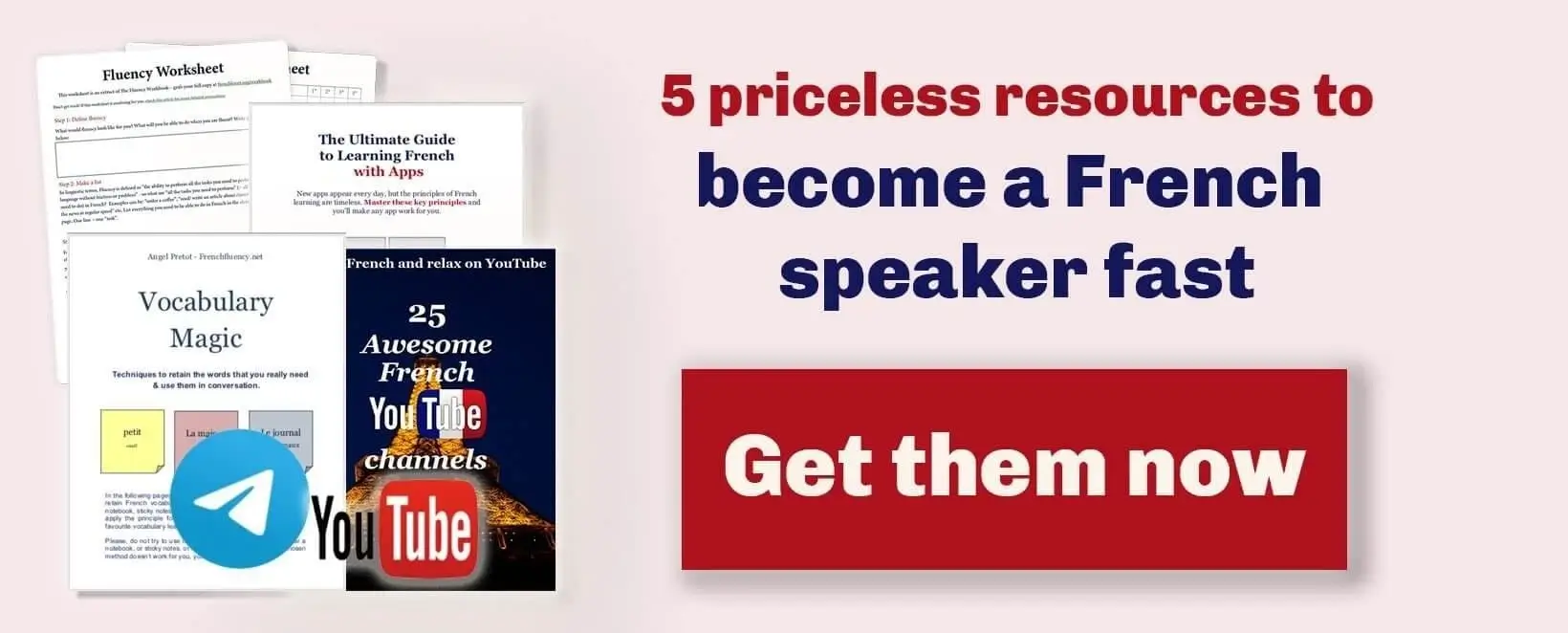
5) Review your new words daily until you know them by heart
Once you have them in your trusted system, you want to review the words every day. That’s also covered in that other article / video so I won’t elaborate too much here, but I’ll say this:
Now that you know you need to review all the words you don’t know yet every day, you’ll agree with me; it’s a lot better to be selective and have a shorter list. Otherwise this process quickly gets out of control.
Which brings me to
6) If the list gets too long, prune it.
You want to remove all the words that you either
- Know by heart after you’ve reviewed them so much, or
- Realize they weren’t useful after all. If it turns out that you never need or feel like using a particular word, remove it without mercy.
Think of it this way: No word lives in your notebook rent-free. If they aren’t contributing right now to improving your ability to communicate in French, they are taking up space and they need to go. You have only so much time and brain space available.
If you have reached a point where your list is way too long, for example your notebook is full, I recommend pruning the list by starting a new notebook and writing all the words you still need to learn by hand again, for two reasons:
1- writing by hand is proven to help your brain form new connections and learn better
2- if you have to write the entire list again, which is a long and tedious task, you’ll get reeeealllly selective with the words you keep, even if it’s just to save some time as you copy the list.
If you don’t have time to prune your list right now, a quick hack is to review just the last pages of your notebook. But it’s a very temporary fix and there’s a risk that words you wrote earlier won’t be properly fixed in your long term memory, leading to a need to relearn it down the line. So I recommend carving out some time to prune your list if it’s out of control. It will save you time in the long run.
7) Learn all the details you need
This is probably the most overlooked rule of how to learn French vocabulary efficiently. I see so many people starting vocabulary lists and writing just a word with a translation next to it. This is better than nothing but it will cause some serious issues down the line when you try to use the words to speak in an actual conversation.
French grammar is full of little traps like gender and conjugation and irregular plurals and words that you can use together or not.
And you don’t get a chance to make a correct sentence if you don’t know the important details that pertain to every word you use in that sentence.
So, if it’s a noun, write down its gender, for example in the form of the corresponding article. If it’s a verb, learn which conjugation it belongs to, if your word has an irregular plural, write it down, etc.
You can also learn words in chunks or write complete sentences in the notebook to remember how a word is used. This will help you tremendously when you have to make sentences using your vocabulary words.
If you’ve been learning French for a long time, and you didn’t do this before, then it’s probably one of the main reasons why you’re not progressing as fast as you like.
If you haven’t learned the little grammar details that help you use the word accurately in a sentence, after a certain level there are just too many parameters that you don’t master. So you feel that you can never “get it right”.
So I recommend gaining awareness of where these details are missing in your vocabulary and relearning the word when there is something critical that you don’t know about it.
For example if you know for a fact that “livre” means book, but you’re not sure if it’s masculine or feminine, rewrite it as “le livre” in your notebook.
If you know that apprendre means learn but you can’t figure out how to conjugate it, you’ll want to write down that “apprendre” is conjugated like “prendre” - and make sure you know the conjugation of prendre because it’s a verb type and it will help you conjugate many other verbs.
The downside of this is that it’s tedious and it can make you feel like you aren’t making any progress, because you’ll have to spend a considerable amount of time relearning things that you thought you had already learned.
This is a big part of why the so-called intermediate plateau is so daunting: on the one hand you see the immensity of what you still ‘have to’ learn and on the other hand you feel like you don’t even master the things that you’ve already learned.
I will make more articles videos about mastering grammar and about the intermediate plateau and how to navigate it because there is a lot to say about these topics. Make sure you subscribe to my YouTube channel so you don’t miss them.
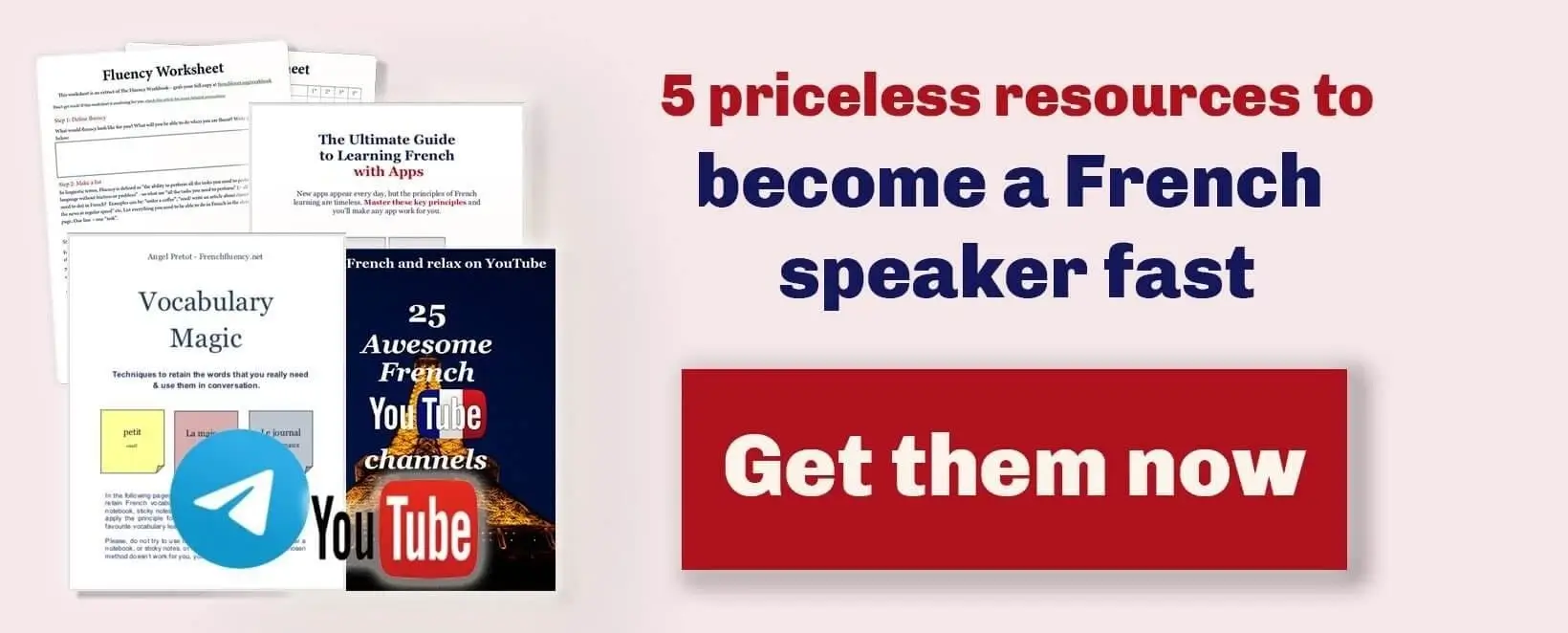
Your next steps
If you like this way of learning French, you will love to learn with me as a student or client. Please check out:
- My 1-1 coaching program, The French Transformation, if you need to improve your French fast.
- My group program, The French Fluency Accelerator, if you’d like to join a community of students from all over the world. We have weekly practice calls together and the best online video library to learn French.
Pro tip: you don’t need to choose!
All my 1-1 clients are invited to join the French Accelerator free of charge.
Feel free to book a call with me now to discuss options.
If you liked this, here's some more:
How to learn French in 5 minutes a day
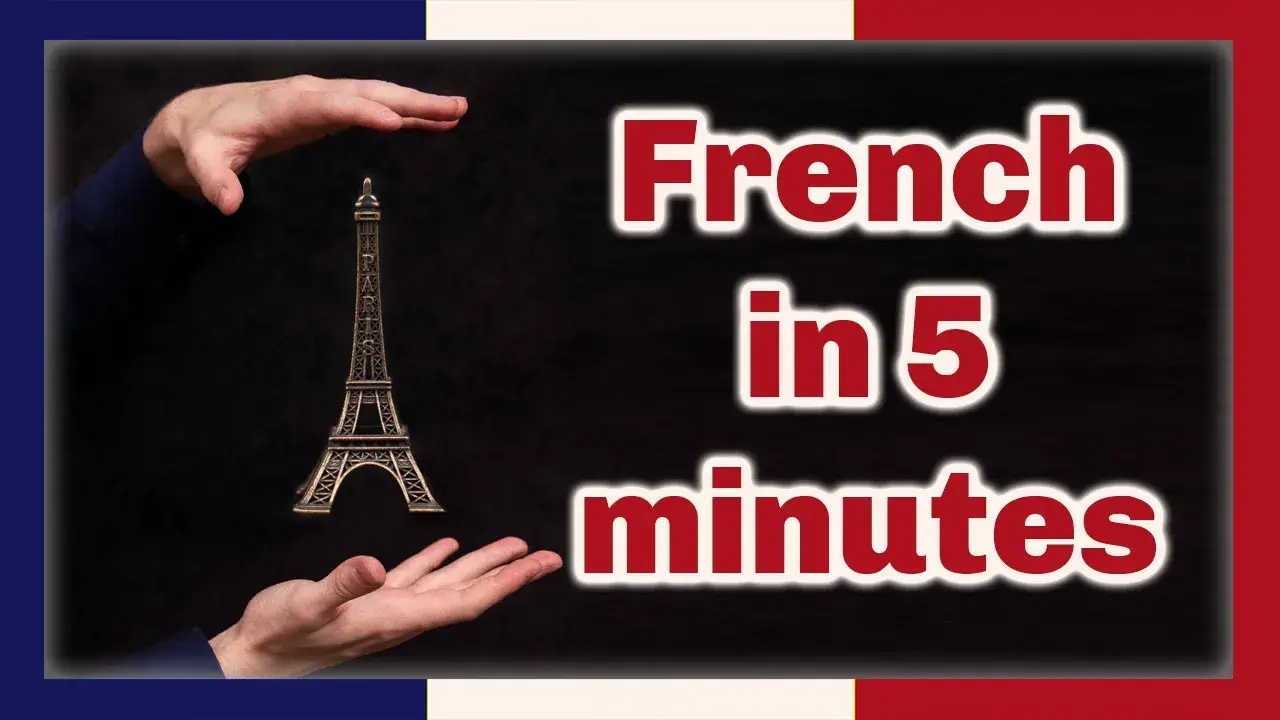
How to watch French YouTube videos without restrictions

About the Author
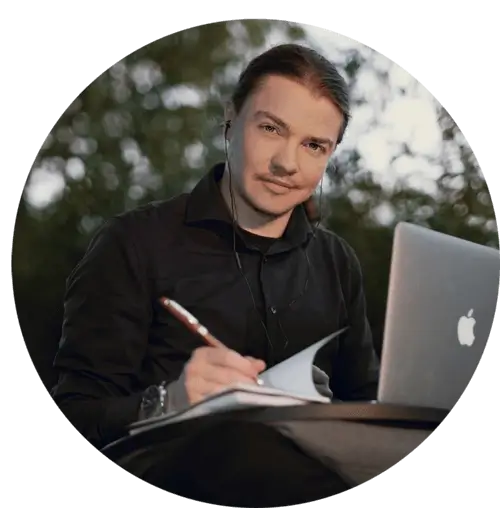
Angel Pretot is a French learning coach. He helps English speakers from all over the world learn French fast and become fluent. You can work with him one-on-one (online via zoom or a similar software) or join a global community of French learners in his group program the French Fluency Accelerator.